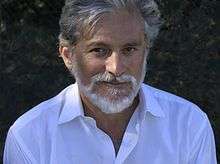Roberto Pazzi
| Roberto Pazzi | |
|---|---|
 | |
| Born |
1946 Ameglia, Italy |
| Occupation | Novelist, poet |
| Language | Italian |
Roberto Pazzi (born 1946, in Ameglia, Italy) is an Italian novelist and poet. His works have been translated into twentysix languages.
Pazzi graduated in classics in Bologna with a thesis on Luciano Anceschi and aesthetics on the poetry of Umberto Saba. He taught cultural anthropology and the philosophy of history and sociology of art and literature in high school and a college in Ferrara.
His first poems appeared in a poetry anthology in the magazine Arte e poesia in 1970. His collections of verse are: L'esperienza anteriore (I dispari, 1973), Versi occidentali (Rebellato 1976), Il re, le parole (Lacaita, 1980), Calma di vento (Garzanti, 1987), Il filo delle bugie (Corbo, 1994), La gravità dei corpi (Palomar, 1998) e Talismani (Marietti 2003).
He published his first novel Cercando l'Imperatore in 1985.[1] The novel was translated into 12 languages and won the Premio Bergamo. He followed Cercando l'Imperatore with various historic novels: La principessa e il drago (Garzanti 1986), La malattia del tempo (Marietti 1987, Garzanti 1991), Vangelo di Giuda (Garzanti 1989) and La stanza sull'acqua (Garzanti 1991, Bompiani 2012).
With Le città del dottor Malaguti (Garzanti 1993) he moved his novels to a contemporary setting in the town where the book's narrator lives, Ferrara. After that, he wrote Incerti di viaggio (Longanesi 1996, premio Selezione Campiello, superpremio Penne-Mosca 1996), Domani sarò re (Longanesi 1997), La città volante (Baldini & Castoldi 1999, finalist at Premio Strega, introduced by Dario Fo and Sebastiano Vassalli, reprinted by Frassinelli ), Conclave (Frassinelli 2001, Barbera 2012, premio Scanno, premio Comisso, Superpremio Flaiano, premio Stresa, premio Zerilli Marimò of New York University, premio Rapolano Terme, finalist at premio Viareggio, finalist at premio Bigiaretti, translated in 15 countries, among these Germany, USA, France, and Spain), L'erede (Frassinelli 2002, finalist at premio Viareggio, premio Maria Cristina, translated in German), Il signore degli occhi (Frassinelli 2004, premio Cala di Volpe), L'ombra del padre (Frassinelli 2005, translated in French, premio Elsa Morante Isola di Procida), Qualcuno mi insegue (Frassinelli 2007), Le forbici di Solingen (Corbo 2007), Dopo primavera (Frassinelli, 2008), and Mi spiacerà morire per non vederti più (Corbo 2010).
Today, after twelve years of exclusive partnership with Corriere della Sera, Pazzi writes for several newspapers including il Resto del Carlino, La Nazione, Il Giorno and The New York Times.
Pazzi lives in Ferrara, where he teaches at the university, holds annual creative writing courses and, for Corbo editore, he leads the series of narrative "L'Isola Bianca". He is an active lecturer in the various countries of the world where his work has spread.
Works
Poetry
- L'esperienza anteriore, I Dispari, 1973
- Versi occidentali, Rebellato, 1976
- Il re, le parole, Lacaita, 1980
- Calma di vento Garzanti, 1987
- Il filo delle bugie, Corbo, 1994
- La gravità dei corpi, Palomar, 1998
- Talismani, Marietti, 2003
Novels
- Cercando l'Imperatore, Marietti, 1985
- La principessa e il drago, Garzanti, 1986
- La malattia del tempo, Marietti, 1987
- Vangelo di Giuda, Garzanti, 1989
- La stanza sull'acqua, Garzanti, 1991
- Le città del dottor Malaguti, Garzanti, 1993
- Incerti di viaggio, Longanesi, 1996
- Domani sarò Re, Longanesi, 1997
- La città volante, Baldini e Castoldi, 1999
- Conclave, Frassinelli, 2001
- L'erede, Frassinelli, 2002
- AA.VV, Dal grande fiume al mare, Pendragon, 2003, pp. 320;
- Il signore degli occhi, Frassinelli, 2004
- L'ombra del padre, Frassinelli, 2005
- Qualcuno mi insegue, Frassinelli, 2007
- Le forbici di Solingen, Corbo, 2007
- Dopo primavera, Frassinelli, 2008
- Mi spiacerà morire per non vederti più, Corbo, 2010
Awards
- Selezione Campiello Prize (1985)
- Bergamo Prize (1985)
- Hemingway Prize (1985)
- Maria Cristina Prize (1986)
- Lerici Pea Prize (1986)
- Piombino Prize (1986)
- Eugenio Montale Prize (1987)
- Rhegium Julii Prize 1987
- Super Grinzane Cavour Prize (1990)
- Castiglioncello Prize (1993)
- Del tascabile Prize (1994)
- Valsassina Prize (1994)
- Selezione Campiello Prize (1996)
- Penne Prize (1996)
- Calliope Prize (1998)
- Frascati Prize (1998)
- Miscia Lanciano Prize (2000)
- Zerilli-Marimò Prize for Italian Fiction (2001) for Conclave
- Flaiano Prize (2001)
- Scanno Prize (2001)
- Comisso Prize (2001)
- Stresa Prize 2001
- Rapolano Terme Prize (2001)
- Maria Cristina Prize (2004)
- Recanati Prize (2006)
- Procida Elsa Morante Prize (2006)
- Scalea Prize (2007)
- Bigiaretti Prize (2007)
- Giorgio La Pira Prize (2008)
References
External links
1) Review of "Searching the Emperor" in The New York Times: 2) "Interview with Roberto Pazzi" in Forum Italicum:
3) Pazzi's poems translated in English, French, and Spanish:
4) "Why the next Pope needs to be Italian", article on The New York Times: http://www.nytimes.com/2004/01/11/opinion/why-the-next-pope-needs-to-be-italian.html?pagewanted=all
5) "Inno alla bellezza" on YouTube, video on the power of Beauty, in Italian